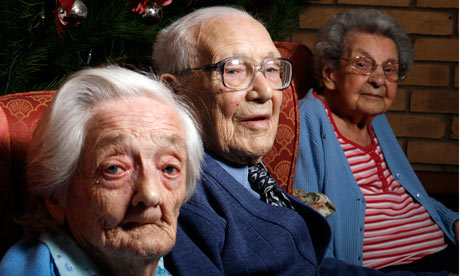
Every day the lifespan of the average British citizen increases by between five and six hours. That means that babies born today will life five or six hours longer, on average, than those who were born yesterday.
It is a striking statistic. And we should note that the trend is likely to continue every day this year and possibly for the rest of the decade. In 10 years, the average British lifespan will have risen more than two years, an increase that has been observed every decade since 1800, when the average UK lifespan was 40. Today it stands at 77.7 for men and 81.9 for women.
"Lifespans have increased with remarkable consistency since 1800," says Professor Tom Kirkwood, director of the Institute for Ageing and Health at Newcastle University. "There was no change in longevity between Roman times and 1800. But after that we see considerable alteration. Every century the lifespan of British people increased by 20 years. Nor is this rise an exclusive British phenomenon. It is observed in most countries today. Only those with particular health problems, like South Africa's HIV infections, have failed to see rises."
The change in UK lifespans has depended on several factors. In the early decades of the 19th century it was mainly due to improvements in civil engineering: sewage works, clean water supplies and better housing. These reduced people's exposure to deadly bacteria and viruses.
That situation changed at the end of the 19th century when the provision of the first vaccines began to protect people from illnesses such as smallpox. And finally, after the second world war, the availability of penicillin and other antibiotics saved millions of lives and continued that lifespan rise. "Young people today do not appreciate that before antibiotics a person could get septicaemia – blood poisoning – from a scratch and die. Antibiotics stopped that," says Kirkwood.
The overall effect of these developments in healthcare was simple: they prevented large numbers of people from dying in youth or middle age – a common occurrence before 1800 – and so fuelled that relentless increase in average lifespans. The surprise for researchers on ageing has been that this phenomenon has shown no sign of slowing down. "In the 1970s and then in the 1980s, the UN published figures that anticipated a reduction in the rate of lifespan increase," he says. "It was assumed we had done as much as we could to reduce the causes of early death, so that lifespans would soon hit a ceiling. That has not happened. Lifespans have continued to rise at the same rate and still show no sign of stopping."
Several factors appear to be involved. In particular, improvements in nutrition have had a profound impact on health and helped to keep lifespans rising. This discovery is crucial. Some scientists had argued that our bodies are programmed to die at a given point, a process that would ensure populations would not be clogged up with the old and infirm. In other words, we have a fixed shelf-life. The relentless rise of lifespans has dispelled this idea.
However, most experts doubt rises can continue at the present rate. If they did, the average UK lifespan would be 100 by the end of this century and 120 by the next. "My feeling is we will see another 10-year increase in average lifespan, but no more this century. However, we are in unknown territory now," added Kirkwood.
This view is backed by Dr Lynne Cox, an Oxford University biochemist and an expert on ageing processes. "I think we will see some slowing down of lifespan rises relatively soon," she said. "In particular illnesses, like diabetes, which are linked to rises in obesity are likely to have an effect on mortality figures and lifespan averages. It is a question of whether obese teenagers choose, in their 30s, to change their ways and become healthy adults or simply don't do anything."

